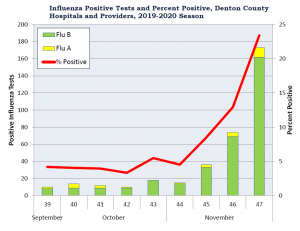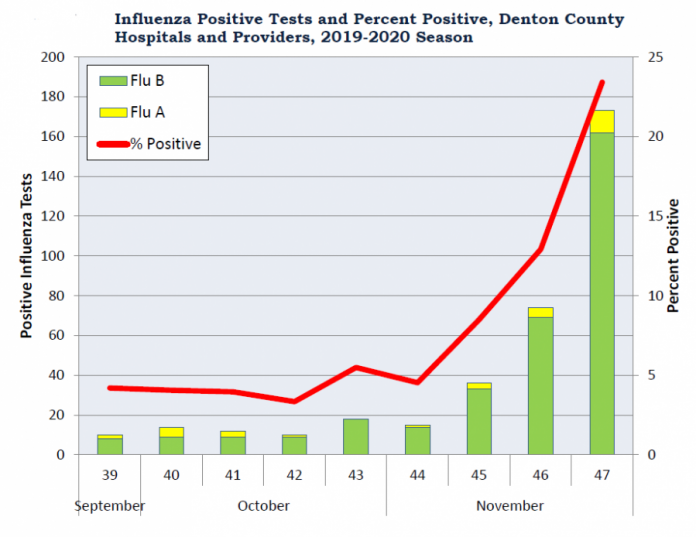
Denton County Public Health is recognizing National Influenza Vaccination Week by urging community members to get their flu vaccine to protect themselves and others this week.
DCPH conducts flu surveillance in Denton County and has already noted increases in cases locally this flu season, according to a DCPH news release. NIVW serves as an annual reminder that even though flu season has arrived, it is still not too late to get a flu vaccine.
“We hope the early and quick rise of flu cases within North Texas can be used as a motivator towards protection for Denton County residents,” said County Judge Andy Eads. “Getting vaccinated is a community effort, and vaccinating now can help protect your children, family, and friends throughout the holiday season.”
DCPH recommends a three-pronged approach to fighting the flu:
- Get vaccinated. The best way to protect yourself and your family from the flu is to get an annual flu shot, and the flu vaccination every year is recommended for everyone 6 months and older. It takes about two weeks for the flu shot to be fully effective, so plan ahead and get your flu shot today.
- Remember that antiviral medications are a second-line defense against the flu. If you are experiencing fever, runny or stuffy nose, sore throat, cough, muscle aches and headaches, visit your doctor immediately and take antivirals if prescribed. These remedies can help you recover quicker, and can potentially prevent you from being hospitalized with flu complications.
- Take everyday preventive actions to help stop the spread of germs. Cover your cough and sneeze, avoid people experiencing flu symptoms, stay home when you feel sick and wash your hands often. These steps will help prevent respiratory viruses, including influenza, respiratory syncytial virus and rhinovirus.
DCPH wants to remind residents that as long as flu viruses are spreading and causing illness, vaccination should continue throughout the flu season in order to protect as many people as possible against flu. Vaccinating also helps safeguard those who are at highest risk of complications or death from the flu, including:
- Pregnant women and women up to two weeks postpartum
- Children younger than 5
- Adults 65 years of age and older
- People living in long-term care facilities
- Native Americans and Alaskan Natives
- People with chronic health conditions such as asthma, neurological and neurodevelopmental conditions, chronic lung disease, heart disease, diabetes, weakened immune system due to disease or medication, kidney and liver disorders, and people with extreme obesity
Weekly Denton County flu surveillance reports and additional information can be found at www.dentoncounty.com/flu. Visit www.cdc.gov/flu for details about symptoms, treatment, and prevention, and search www.vaccinefinder.org to find the vaccine in your neighborhood.






.jpg)







